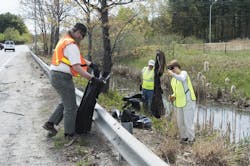Community Cleanup Uses Trash for Environmental Research
Portland, Maine-based Hydro Intl., a global supplier of products and services used for the treatment of storm water and wastewater, worked with United Way and the Cumberland Country Soil and Water Conservation District (CCSWCD) to clean up trash from the Long Creek Watershed May 19. The waste collected during this collaborative volunteer day will be used in a research study to enhance water quality treatment across the country and the world.
“We’re very pleased that our involvement in a community cleanup project in our backyard will generate water quality research that can be applied across the globe” said Jim Newkirk, director and general manager of Hydro Intl. Americas Storm Water Division. “Understanding the types and quantity of materials that eventually make their way into drainage lines and water bodies will advance our understanding of how and what our treatment systems need to remove in order to help better water quality.”
More than a decade ago, the Long Creek, which runs through Westbrook, Scarborough and Portland, was identified as an urban impaired watershed. In 2007, with guidance from the Maine Department of Environmental Protection along with funding from the Environmental Protection Agency, the community came together as part of a restoration project led by a steering committee comprised of the above-mentioned municipalities as well as area businesses and state agencies.
The scheduled cleanup focused mainly in and around the South Portland mall area and will help prevent trash and other harmful pollutants from making their way into the Long Creek where it could otherwise harm the local aquatic ecosystem.
The research study will take place in Hydro Intl’s hydraulics laboratory in Portland, Maine. This facility is one of the largest manufacturer-owned testing facilities in the country and, has been used for water quality performance verification for the New Jersey Department of Environmental Protection, the Massachusetts STEP (Storm Water Technology Evaluation Project), the Maine Department of Transportation as well as many industrial facilities operating under a storm water discharge permit.
Results of the study will be made available to the larger water treatment industry in the coming months.
Source: Hydro Intl.
